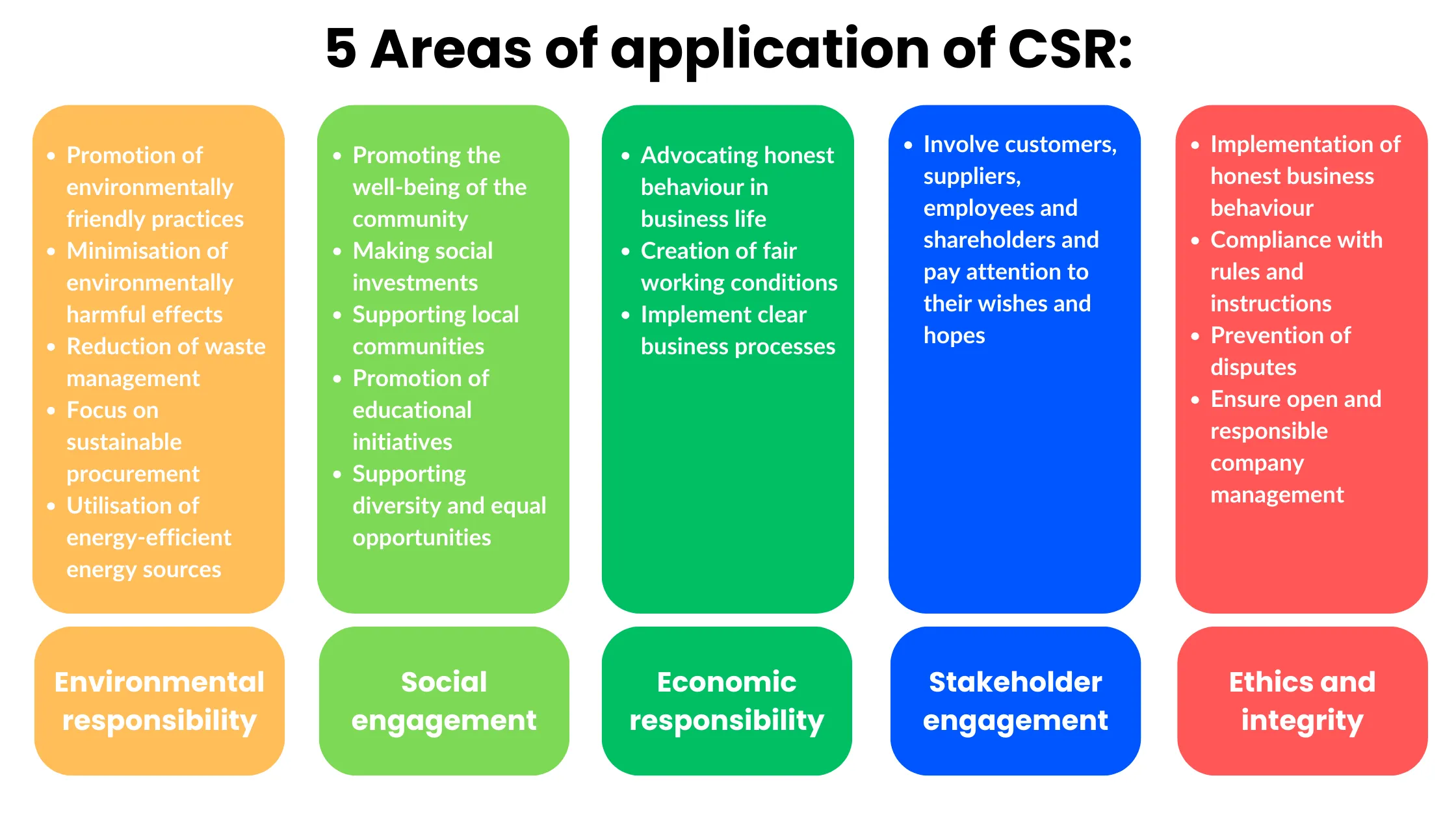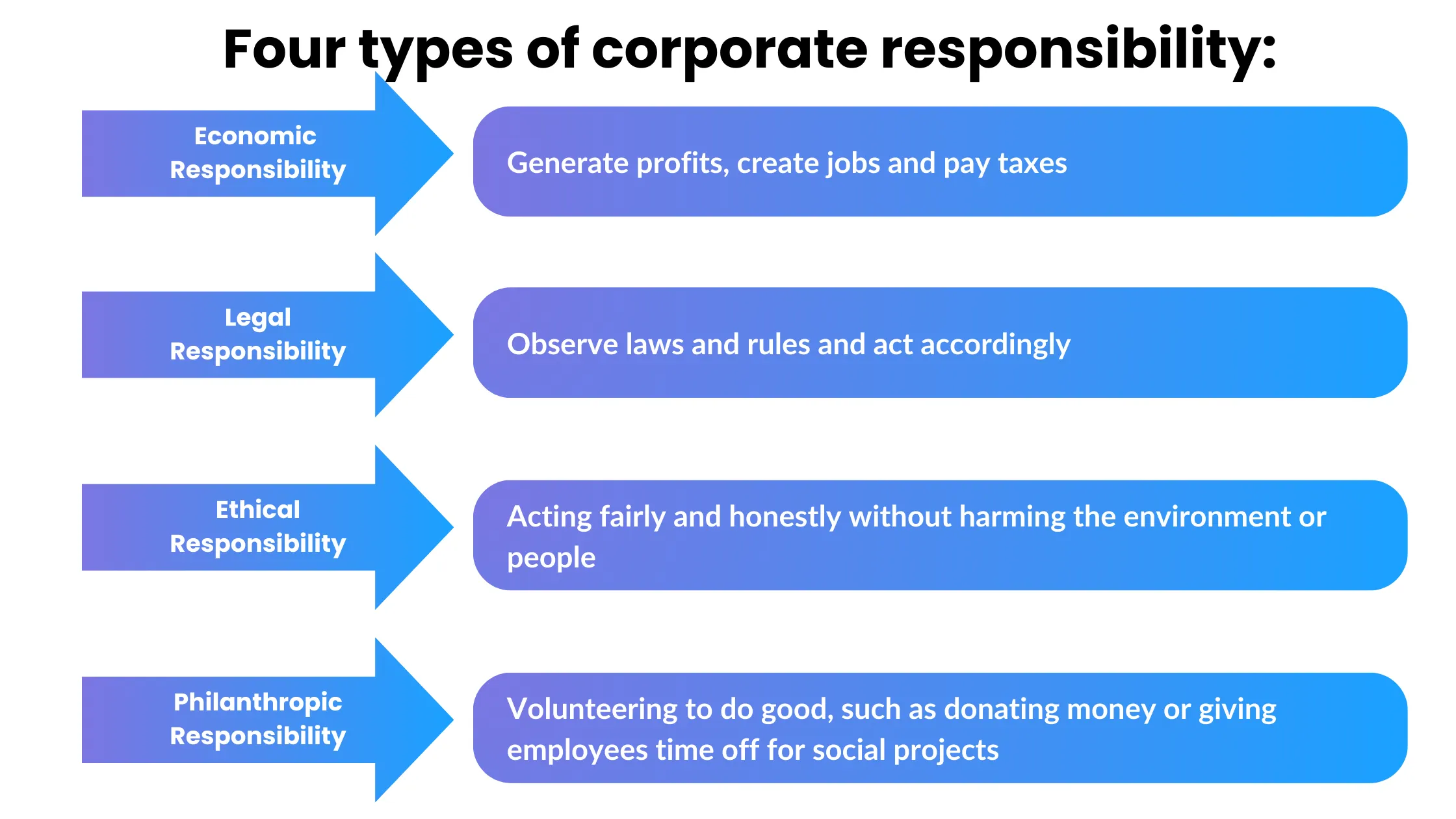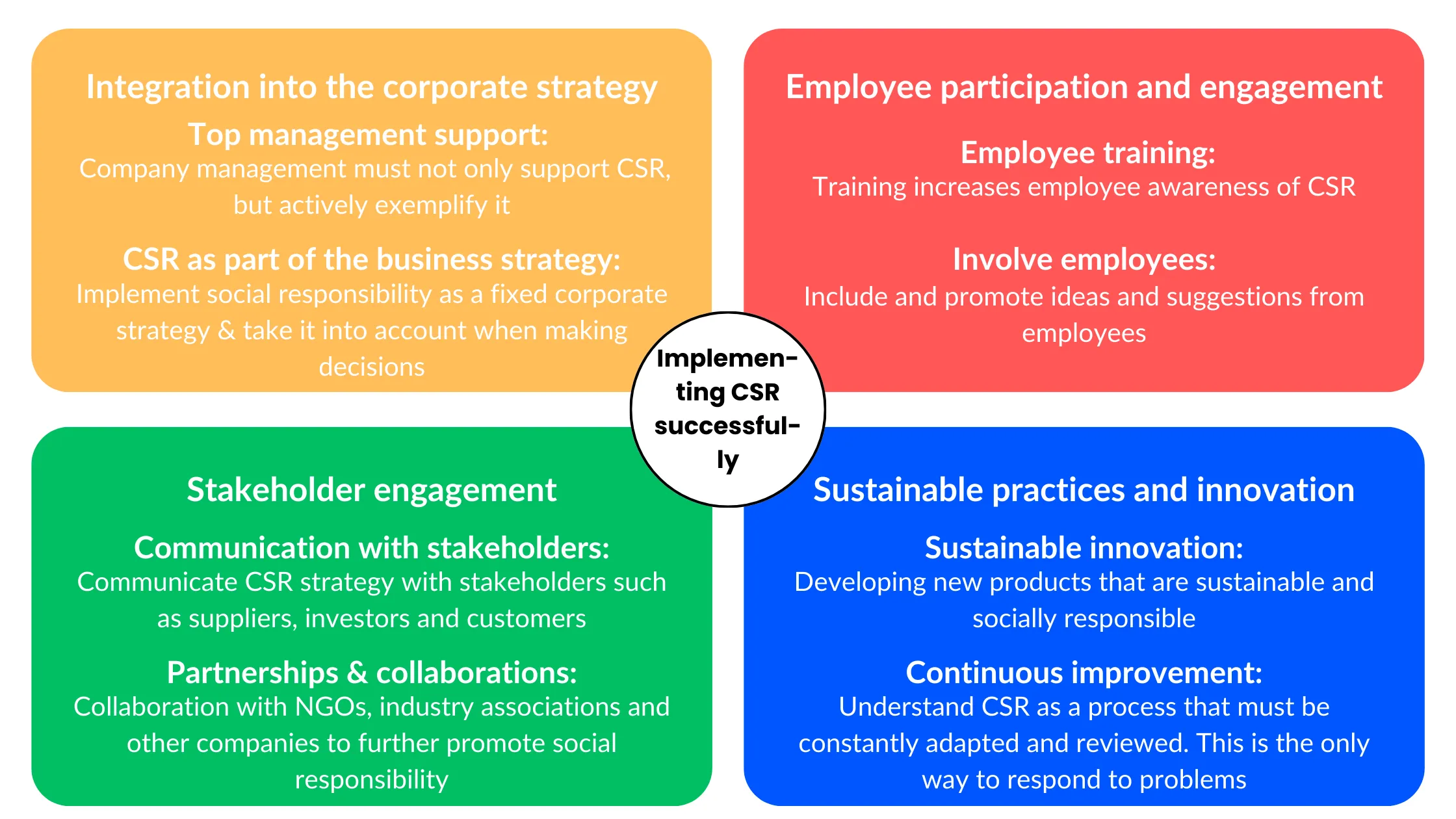From obligation to opportunity: Corporate Social Responsibility (CSR) in Germany
Sustainability & ESG - Reading time: 13 Min

Corporate social responsibility, or CSR for short, is about the responsibility that companies bear. It is about how they influence society and the environment. The German government attaches great importance to this because it wants companies to get involved. There are government guidelines and even a prize for this. Another important law in this context is the Supply Chain Duty of Care Act. It is intended to encourage companies to organize their supply chains sustainably. This means that they must ensure that their products are produced in a fair and environmentally friendly way. The definition of CSR explains what corporate social responsibility means and the guidelines provide clear guidance on how companies can put this responsibility into practice. If you want to know more about sustainability actions by companies in Germany, there is a lot of information available. It is important for companies to understand the basics of CSR if they really want to take their social, environmental and economic responsibilities seriously and act sustainably.
In brief: Everything you need to know about CSR
Corporate Social Responsibility (CSR) describes the responsibility of companies beyond pure financial success. Social and environmental issues are incorporated into business decisions. CSR serves as a role model for companies to fulfil their social responsibility and promote sustainable growth. International guidelines such as the ILO Declaration of Principles, OECD Guidelines or the UN Global Compact provide orientation for responsible entrepreneurship.
The aim is to think long-term and embed social responsibility in the business strategy and to create a balance between economic goals and the well-being of society and the environment. CSR not only enables companies to better manage risk, but also offers new opportunities for sustainable growth. CSR encompasses various tasks and measures such as environmental responsibility, social commitment, economic responsibility, stakeholder management and ethics. Through these activities, companies can make a positive contribution to society and strengthen the trust of their customers and partners. However, CSR not only offers the opportunity to comply with rules, but also brings many advantages for companies. By taking social and environmental issues seriously, a company's image can be improved and customers and employees can become more loyal to the company.
In order to utilise these advantages, companies need a well-founded CSR strategy and a dedicated team to deal with it. Corporate social and environmental responsibility should be an integral part of the business strategy. There are four types of corporate responsibility: economic, legal, ethical and philanthropic. Each of these areas of responsibility helps to improve the company's image and have a positive impact on society.
In Germany, there are numerous opportunities for companies to act in a socially responsible manner. The German government provides information and guidelines to support companies in their responsible behaviour. Environmental initiatives such as increasing energy efficiency, sustainable resource utilisation and reducing CO2 emissions are just a few examples. Social commitment by ensuring fair working conditions and supporting the local community also plays an important role.
In addition to implementing these measures, it is crucial to consider CSR as an integral part of the corporate strategy. The active involvement of top management as well as training and participation programmes for employees are crucial to success. Communication with stakeholders and co-operation with NGOs and other companies contribute to the further development of CSR projects. Continuous improvement and an open attitude towards sustainability are also important aspects. Of course, there are also challenges to be expected when integrating CSR. A detailed plan with clear steps and a deep integration of CSR into the company's core business are key factors for long-term success.
Subscribe to never miss any insights.
Receive regular insights and updates on the latest developments in the areas of LkSG, CSDDD, CSRD, ESRS, compliance, ESG and whistleblowing. Our newsletter helps you to simplify your compliance processes.
Corporate Social Responsibility at a glance
Corporate Social Responsibility, or CSR for short, is about the responsibility of companies that goes beyond making money and also includes social and environmental issues. Nowadays, CSR is a key concept when it comes to corporate morality, as companies should consider social and environmental concerns alongside financial success. According to the European Commission's definition, sustainable business means that companies take responsibility for their impact on society. This stands for corporate management that thinks long-term and has embedded social responsibility deeply into its business strategy.
If you take a closer look at this definition, these three important points stand out:
- the voluntary nature of the commitment
- the clash between social and ecological concerns
- the importance of the company's various stakeholder groups
CSR is therefore about things such as fair business practices, a good HR policy for employees, careful use of natural resources, protection of the climate and environment, involvement in the local community and responsible action in the supply chain. Sometimes the shorter term corporate responsibility (CR) is used instead of corporate social responsibility.
CSR is not a law and does not provide precise guidelines, but is more of a model that companies can use as a guide. It sets higher standards than those required by law and is based on ethical and moral principles. It motivates companies to live up to their responsibility to society and to promote sustainable growth.
In order to implement a social commitment in companies, companies can be guided by internationally recognized guidelines. These include the ILO Declaration of Principles concerning Business and Social Policy, the OECD Guidelines for Multinational Enterprises, the UN Guiding Principles on Business and Human Rights, the UN Global Compact and ISO 26000. These documents provide guidance and tips for responsible corporate governance.
Responsible entrepreneurship must be practiced throughout the company and goes beyond mere donations to charitable organizations. The CSR Directive requires companies to comply with non-financial reporting in the form of a CSR report in order to avoid corruption or deception. ISO 26000 provides guidelines for defining, implementing and monitoring corporate social responsibility for the environment and society.
Corporate Citizenship
Corporate citizenship means when companies are committed to the common good, above and beyond their normal work. This mainly includes things such as financial support, donations and the work of foundations. This term is one aspect of corporate social responsibility.
A good example of corporate citizenship is the support of initiatives for the professional integration of disadvantaged groups or the promotion of diversity and inclusion in the workplace. These measures show that the company is not only committed to its employees, but also makes a contribution to social development.
Corporate Volunteering
Corporate volunteering refers to the practice whereby companies encourage and support their employees to volunteer for charitable causes. This is an important part of corporate social responsibility and enables companies to make a positive contribution to society.
Through various programs, such as paid time off, team volunteering or the provision of professional support, employees can get involved in social, ecological or cultural projects. This increases their motivation and satisfaction, improves the company's image and promotes team spirit.
Corporate volunteering has many advantages: It enables companies to fulfill their social responsibility, strengthens employee loyalty and improves cooperation within the workforce. At the same time, it contributes to the development of new skills that are also valuable in a professional context. Overall, corporate volunteering is an effective strategy for both creating social benefits and positively influencing the corporate culture.
CSR management
CSR management motivates companies to rethink their role in society by going beyond mere business success and taking a comprehensive approach to social and environmental issues. This means introducing sustainable methods in all parts of corporate management and planning, from new product development to the supply chain and energy consumption. The aim is to achieve a balance between economic goals and the well-being of society and the environment. By incorporating these principles into their core business strategies, companies can not only better manage their risks and improve their reputation, but also find new opportunities for growth. In this way, they create sustainable value both for themselves and for society as a whole. This comprehensive approach helps companies to act responsibly and actively contribute to a better social and environmental future.
Characteristics and components of CSR
Corporate social responsibility is based on the idea that companies should maximize their positive impact on society and all those who have an interest in it and minimize their negative impact. Sustainable action is a central principle here. In recent years, it has become increasingly clear that CSR also affects the supply chain. This means that companies should strive to ensure that their suppliers comply with basic labor, social and environmental standards.
Many definitions of CSR particularly emphasize its voluntary nature. This emphasizes that companies assume social responsibility by doing more than the law requires. However, the strong emphasis on voluntariness in the context of social commitment can also be difficult. It could be overlooked that companies are also obliged to comply with the law and follow generally accepted social standards. Examples such as discrimination, violations of human rights, price fixing, tax evasion or environmental damage show that it is not always a matter of course to behave correctly.
CSR comprises various tasks and measures that companies can implement in order to make a social and environmentally friendly commitment:
- Environmental responsibility: Companies should promote environmentally friendly practices and minimize environmentally harmful effects, e.g. through energy efficiency, waste reduction and sustainable procurement.
- Social engagement: Companies should promote community wellbeing by making social investments, supporting local communities, promoting educational initiatives and supporting diversity and equal opportunities.
- Business responsibility: Companies should promote honest business conduct, ensure fair working conditions, comply with all laws and ensure open and clear business processes.
- Stakeholder management: Companies should pay attention to the wishes and hopes of all stakeholders, such as customers, suppliers, employees and shareholders, and involve them.
- Ethics and integrity: Companies should ensure honest business conduct, follow rules and guidance, prevent disputes and dishonest behavior, and promote open and responsible management of the company.
These aspects of CSR help companies to make a positive contribution to society and increase the trust and loyalty of their customers and partners. When companies incorporate sustainable business practices into their actions, they can achieve long-term benefits for society, the environment and the economy.
The demand on companies for responsible corporate governance
Corporate social responsibility is very important for companies in Germany, which is what the term corporate stands for. Many companies see it as an opportunity to fulfill their responsibility towards society and the environment. CSR means that companies do more than just comply with the law. They are voluntarily committed to a better future.
What exactly does that mean? Companies should not only do what the law requires. They should also behave as good members of society. This means that they actively work to improve the world in a sustainable way. To achieve this, there is sustainability management. This management plans how a company can achieve its sustainability goals. It involves key people and shows how to apply corporate social responsibility in everyday life. Good corporate responsibility management, also known as corporate citizenship, also supports performance measurement and reporting.
When companies participate in volunteer programs, they can actively promote the principles of the Global Compact established by the EU Commission and thus make an important contribution to global sustainability goals. One example of a corporate volunteer program is the Global Volunteer Day (GVD) run by DHL, a major logistics company. During this annual event, employees around the world help in local projects that focus on environmental protection, education and disaster relief. They take part in activities such as planting trees, renovating schools or collecting donations for those in need. This program shows how companies can use their resources and the commitment of their employees to have a positive impact on society and raise awareness of environmental, social and governance(ESG) sustainability issues.
The Supply Chain Duty of Care Act requires companies to act responsibly in their supply chain too. Corporate responsibility is therefore not only an obligation, but also an opportunity. Companies can help to solve global problems and shape a sustainable future. Experience shows that responsible corporate governance pays off. It brings benefits for the company, society and the environment. Information and assistance on ecological and social corporate governance can be found, for example, at the German government's CSR Prize.
Is the implementation of CSR management mandatory?
Many companies in Germany are wondering whether they need to introduce corporate responsibility management. So far, there is no general obligation to do so. However, the German government has provided assistance such as guidelines to encourage companies to behave in a socially and environmentally responsible manner. There is even a prize for companies that are particularly exemplary in this respect.
Large companies in particular are expected to behave in an environmentally aware and socially responsible manner. This also includes closely examining their supply chains. The Supply Chain Duty of Care Act makes these expectations even clearer. From 2023, large companies with over 3,000 employees must comply with this law. Since January 1, 2024, this also applies to companies with more than 1000 employees.
However, good environmental and social corporate governance can do more than just make social sense. It can also help companies to win new customers, improve their image and avoid risks by making their supply chains more transparent.
Meet the requirements of the LkSG
Clear supplier management: centralized supplier management and risk assessment in one place.

Who is affected?
Corporate social responsibility has now become an important topic for many companies in Germany. This raises the question of who is actually affected by its implementation and when. The German government has already published guidelines and information(on the guidelines) to help companies implement ecologically sustainable corporate management. A new development is the Supply Chain Act, which is intended to ensure that companies also manage their supply chains in a socially responsible manner in future. There are therefore already a number of measures and obligations relating to CSR policy in Germany that are important for all companies. Nevertheless, it depends on each company itself how committed it is and how seriously it takes its responsibility.
Areas of responsibility and measures for implementation
Nowadays, it is important for companies to behave responsibly - this is called corporate social responsibility(to the article by the Federal Ministry of Labor and Social Affairs). The German government has sent out clear signals: it expects companies to pay attention to how they act. It demonstrates this with laws such as the Supply Chain Duty of Care Act and the National Action Plans, or NAPs for short(to the Federal Government's text). But corporate social responsibility does not just mean following rules. It also offers companies many advantages. If a company takes social and environmental issues seriously, it can improve its image and increase customer and employee loyalty. It can even help to discover new business areas. Considering economic developments in the context of CSR shows that sustainable action and economic success can go hand in hand.
But to really reap these benefits, companies need a good CSR strategy and a team to take care of it. In business practice, it is essential that companies take responsibility for their impact on society and the environment and integrate this into their business strategies. In short, social responsibility in business is not only a must - it is also an opportunity for companies to grow and be successful in the long term.
The 4 areas of responsibility
An important aspect of corporate social responsibility is the assumption of responsibility by companies.
There are four types of corporate responsibility:
- Economic responsibility: Companies should make a profit and be economically strong. They should generate profits for their owners, create jobs and pay taxes.
- Legal responsibility: Companies must comply with the law. Your business should always comply with the rules.
- Ethical responsibility: Companies should be fair and honest. They should do good things without harming the environment or people.
- Philanthropic responsibility: Companies can also do good voluntarily, such as donating money or giving employees time off for social projects.
Each of these types helps to improve a company's image and has a positive impact on society.
The areas of responsibility are mapped in the Code of Conduct. It forms a link between companies and their suppliers. As a binding document, it sets out what is expected of companies and suppliers in terms of social and environmental standards.
Implementation measures
In Germany, there are many opportunities for companies to act in a socially responsible manner. The German government provides guidance and information to help companies act in a globally responsible manner. The Supply Chain Act is particularly important here in order to ensure compliance with human rights throughout the supply chain. By making a targeted commitment to sustainable developments, companies can achieve positive effects in the long term.
Environmental initiatives
- Increase energy efficiency: Invest money in technologies that require less energy and improve existing processes to reduce energy consumption.
- Sustainable use of resources: Using environmentally friendly or recycled materials in production and creating less waste through recycling programs.
- Reduce CO2 emissions: Implementing measures to reduce greenhouse gas emissions, for example by using renewable energy sources or offsetting emissions.
Social commitment
- Fair working conditions: Ensuring fair working conditions throughout the supply chain, including appropriate wages and compliance with working hours.
- Health and safety in the workplace: Improving working conditions by taking measures to increase safety and protect the health of employees.
- Community engagement: Helping local communities through donations, volunteering or supporting social projects.
Business ethics
- Transparency and integrity: Supporting a culture of openness and ethical business practices, including clear communication with all stakeholders.
- Anti-corruption: Introduction of strict rules and procedures to prevent corruption and fraud.
- Data protection and information security: Ensure that personal data and confidential information are protected.
By implementing these steps, companies can help create a greener and fairer world while improving their own long-term competitiveness and reputation. CSR is not just a fixed idea, but a moving target that requires constant review and adaptation to respond to new issues and opportunities.
Covering all areas of CSR responsibility
Our experts will answer all your questions about corporate responsibility and supply chain due diligence regulations.

Implementing CSR successfully - a guide
Companies can implement environmentally friendly business practices well if they have clear goals and their managers actively participate. It is important to see CSR not just as a must, but as an opportunity for sustainable growth. To implement projects successfully, it is not enough just to have a plan; it must be deeply embedded in the way the company operates.
These important points and procedures can help companies to introduce CSR principles effectively and maintain them in the long term:
Integration into the corporate strategy
- Top management support: For corporate social responsibility to be successful, it is crucial that the company management not only supports the initiative, but also actively promotes and exemplifies it. This sends a strong signal to all employees and stakeholders about the importance of corporate social responsibility in the company.
- CSR as part of the business strategy: Corporate social responsibility should not just be seen as an individual project, but should be an integral part of the corporate strategy. This means that social responsibility should also be considered in all decisions and processes within the company.
Employee participation and engagement
- Employee training: Education and training programs are crucial to increasing employee awareness and understanding of corporate social responsibility issues. This creates a common basis for commitment and motivation to contribute to the achievement of corporate social responsibility goals.
- Involve employees: Employees should be encouraged to come up with their own ideas and suggestions for corporate social responsibility projects. This can be done with competitions for ideas, working groups or special teams that take care of the development and implementation of these projects.
Stakeholder engagement
- Communication with stakeholders: Talking often and clearly with everyone involved, such as customers, suppliers, investors and the local community, is very important to get CSR right. This builds trust and you get useful feedback.
- Partnerships and collaborations: Working with NGOs, industry associations or other companies can help corporate social responsibility projects go further and achieve more. Such partnerships make it possible to share good practices and can lead to new ideas.
Sustainable practices and innovation
- Sustainable innovation: Developing new products, services or ways of doing business that both make money and help society or the environment is very important to the success of corporate social responsibility. Companies should support innovations that promote a greener economy.
- Continuous improvement: CSR is a process that needs to be constantly reviewed and adapted so that it can respond correctly to new situations and problems. Companies should always be looking to improve and be open to new ideas.
Successful corporate social responsibility requires commitment, a plan and constant effort. When companies build corporate social responsibility into their business plans, involve employees and champion the interests of those involved, they can ensure that their projects are effective and long-lasting. This not only improves the company's reputation.
A challenge for companies
Companies are faced with the challenge of successfully implementing and realizing CSR. This requires a holistic management of social responsibility that goes beyond mere lip service. Implementation within the company requires a strategic approach that focuses not only on short-term goals, but also on the company's long-term vision. The following key steps and considerations for successful implementation of CSR initiatives can contribute to this:
Strategic planning
It is critical to establish a clear vision for social responsibility and precise goals that align well with the company's core values and address important social and environmental issues. This clear focus ensures that social responsibility activities are genuine and goal-oriented.
A close examination of who is affected by the company's social activities and what these people expect is very important. This includes employees, customers, suppliers, the local community and nature. By understanding these perspectives well, the company can plan its social projects in such a way that they have a truly positive impact.
An important part of corporate social responsibility planning is also assessment to identify the most important issues for the company and its stakeholders. By prioritizing these issues, available resources can be allocated where they will have the greatest benefit for sustainability and the achievement of social and environmental goals.
Implementation phase
Making a precise plan is very important in order to properly implement corporate social responsibility. This plan should set out clear steps of who does what, when it is done and how success is measured. This way you can ensure that you are making targeted progress and that your social responsibility efforts are successful.
It is crucial for long-term success that social responsibility is deeply embedded in a company's core business. This responsibility needs to be part of all areas of the company and all decisions, so that it is firmly anchored in the company's culture and way of working. This ensures that social responsibility positively influences daily operations and contributes to the company's overall strategy.
It is also very important that employees actively participate in CSR projects. By offering training and encouraging engagement, companies can increase employee awareness and support for CSR goals. This creates a culture in which employees are motivated to help and contribute to the company's social goals.
Practical examples
A good example of successful CSR in Germany is the "Rewe Group", which is constantly expanding its commitment to sustainability and social responsibility.
The Rewe Group in Germany shows very well how to make CSR successful by constantly strengthening its commitment to sustainability and social responsibility. One impressive project of theirs is the reduction of plastic packaging, with the aim of greatly reducing the use of plastic and thus having less impact on the environment. This shows how hard the Rewe Group is working to be more environmentally friendly in its stores and raise awareness of the problem of plastic pollution.
The company also strongly supports local suppliers. This is not only good for the local economy, but also reduces CO2 emissions because the goods do not have to be transported as far. This approach makes the supply chain more environmentally friendly and improves relations between the company, local suppliers and the community. With such actions, the Rewe Group sets new standards for environmentally conscious management and shows how companies can have a positive impact on society and the environment by acting responsibly.
Advantages and benefits of CSR for companies
Social responsibility brings many advantages for companies that can have a positive impact on their reputation and success. A well-considered social responsibility strategy allows the company to direct its own commitment to society and demonstrate it in a targeted manner. In this way, it can improve its image and gain a better reputation. The company also becomes more attractive as an employer because more and more people attach importance to social commitment. When looking for qualified employees, these companies have an advantage thanks to their commitment to social responsibility.
Corporate social responsibility also helps to increase customer loyalty. If companies have a good concept for social responsibility, they can attract customers and build long-term relationships. Social responsibility also increases employee loyalty and motivation. When employees see that their employer cares about society, they feel more connected to the company and are more motivated.
CSR can also be helpful for risk management. By reacting to changing environmental standards at an early stage, companies can reduce risks and avoid economic damage, while corporate social responsibility also promotes innovation, reduces costs and helps to protect natural resources. Those who have focused on new energies at an early stage are now in a better position than competitors who have not done so. Corporate social responsibility can pay off economically. New, innovative approaches can save costs. Companies that focus on renewable energies as part of their social responsibility can reduce their energy costs. Using available resources sparingly often brings benefits. The cost savings often translate into tax savings and can even result in the promotion of innovations.
Investors also view companies with a clear concept for social responsibility positively. They assume that such companies will be successful in the long term and have a positive impact on society.
If companies incorporate social responsibility into their culture, they can maintain their position on the market in the long term and at the same time do good for society and the environment. Corporate social responsibility is therefore not only important for moral reasons, but also brings economic benefits.
Criticism and challenges
Even though the idea of corporate social responsibility is generally considered important and necessary, there is criticism of it. Some consider CSR to be too non-committal and without any real steps, so that companies often stop at just the ideas.there is concern that many companies only use CSR as an advertising measure to improve their image and make it easier to attract new employees or customers(greenwashing). They are accused of not really caring about an ethical approach to their business model. Instead, they want to use CSR to boost their business and ultimately earn more. Critics believe that the voluntary concept is primarily used to circumvent strict laws and standards that would force companies to do more to protect the environment.
Social responsibility can also prove challenging for companies. It takes time and resources to implement this responsibility, and it must be integrated into all key areas of the company. With difficult topics such as corporate social responsibility and digitalization, you need to allow enough time. In day-to-day business, this can lead to delays and everything takes longer. It is therefore important to communicate well so that employees and customers are aware. Developing appropriate processes and procedures can cost a lot of time and money. A well-structured corporate social responsibility reporting system can help to maintain an overview. Despite these difficulties, it is usually beneficial for companies in the long run to address their social responsibility.
The role of the CSR manager
The CSR manager plays a decisive role in the management and implementation of a company's corporate social responsibility strategy. They play a key role in the development, organization and control of corporate social responsibility projects and programs. These should help to strengthen the company's commitment to society and the environment. Its most important tasks include
- Strategy development: The CSR manager develops and explains the CSR strategy so that it fits in well with the company's overall strategy. They set goals, determine what is most important and plan actions.
- Integration: The CSR manager ensures that the rules of social responsibility are incorporated into all of the company's working methods. As a result, this responsibility becomes an integral part of the corporate culture and daily business.
- Stakeholder management: The CSR manager is the most important point of contact for people inside and outside the company. He or she improves communication between the company and these people and pays attention to what they expect and need.
- Reporting: He is responsible for creating and publishing clear reports on CSR actions and their results. This shows progress and strengthens the trust of stakeholders.
- Monitoring and evaluation: Establishes and implements monitoring systems for CSR project performance, identifies areas for improvement and modifies activities accordingly.
- Employee engagement: He makes employees aware of the company's social responsibility through training and campaigns and encourages them to participate.
- Promoting cultural change: It helps to create a corporate culture in which social responsibility and long-term growth are important.
- Networking: He seeks contact with other groups and represents the company at professional meetings. There he shares good working methods and keeps abreast of the latest developments in corporate responsibility.
In short, the CSR manager is very important in ensuring that the company acts in a socially responsible manner. He or she not only takes care of things within the company, but also influences how the company looks to the outside world and how it treats other groups.
Corporate Social Responsibility: Global challenges
Corporate social responsibility means that companies must take care of the social and environmental consequences of their work. The German government has understood this and supports companies becoming more involved in this area. In order to implement this, there are various instructions and information on how companies can incorporate CSR into their daily operations. Companies should understand that a good policy on environmental and social issues is not just about obligations. It is also about companies showing how they want to improve society, which can also help them to look better. The Supply Chain Act helps companies to show how they can act responsibly. It requires them to deal more clearly and responsibly with environmental and social standards in their supply chains. Major problems such as climate change or poverty require companies to act responsibly.
To summarize: CSR does not just mean that companies should operate sustainably. It is also about helping global development.


